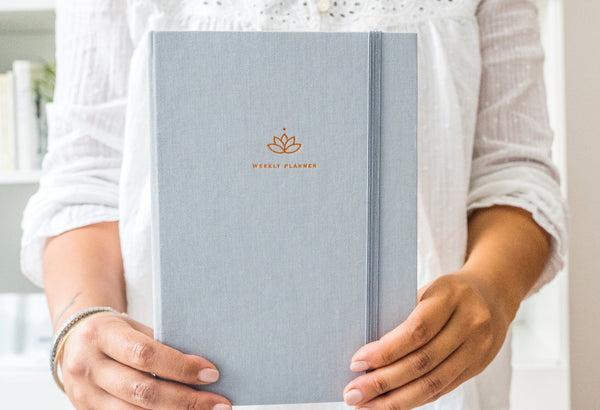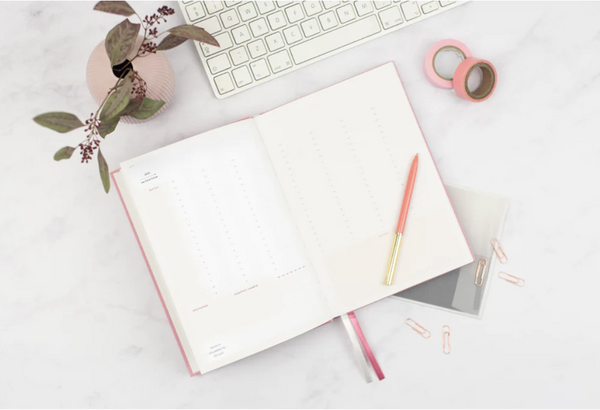“New Year’s Resolutions” conjure up a certain set of images, ideas, and beliefs. For example: They are onerous and too hard to stick to. They are falsely optimistic or downright unhealthy/harmful. They won't last beyond Jan 10th. They require some huge life change — which is both unrealistic and just too overwhelming. The list could go on and on…
But the new year is a great indicator of a fresh start, and an opportunity to rechart your course. Especially if you’re feeling you’ve wandered way off the path. It’s a chance to begin again and change up your routine. Where were you at this time last year? Did you achieve your goals? If not, maybe it’s not because they were bad ideas, but rather because they didn’t set you up for success, or worse, they set you up for failure. Having a good philosophy of intentional planning, instead of just executing poorly thought-out plans over and over again, leads to a more sustainable lifestyle.
Here are 6 steps to creating New Year’s resolutions that will last long after January.
Acknowledge the Past
The New Year is the perfect time to reflect on the past, take stock of wins, losses, disappointments and bright spots. This will give you a more meaningful (and realistic) place to begin setting resolutions.
You must first acknowledge the past before you can envision the future. Think about it: you can't know where you're going until you know where you are.
Start by identifying what went well this year. What were the highlights? The wins? What do you feel proud of? Grateful for? Then, try to identify what did not go well for you last year. Write down the disappointments, challenges and losses. Don’t worry so much about why any of these things happened, and certainly stay clear of judging any of your feelings. This exercise is simply about remembering and acknowledging. And it will inform what you want to happen and how you want to feel in the new year.
When you acknowledge where you’ve been for the last 12 months, where you intentionally took yourself and where life has taken you (sometimes beyond our control), you set the stage for a meaningful path forward. One that is rooted in the realities of your life and where you are right now. After all, you can’t be anywhere but where you are now.
So, take some time to acknowledge it—the good, the not so good and the in-between.
Finish What You Started
New Year’s resolutions don’t always have to be about starting from scratch. Some of the most satisfying intentions you can set are about finishing what you start. What incomplete actions can you address? What is left to wrap up? What is yours to complete or finish?
Maybe you have a list of follow-ups to tackle, whether business leads or personal connections. Or perhaps you have a pile of clothes and goods waiting to be donated. What about that small website update that’s been hanging over your head for months? Trust me—nothing will feel better than finally prioritising and finishing these tasks.
Give some thought to where you can meaningfully close the loop on unfinished tasks and start the new year (or at least February!) from a clean slate.
Commit to Being, Not Doing
You’re probably familiar with the idea of being vs. doing. Or maybe you’ve committed to resolutions in the past that left you feeling empty, because the action wasn’t rooted in who you want to be. It was all about getting something done, checking it off the list. And ultimately, it wasn’t making life more meaningful.
Sometimes our goals and resolutions are more effective if they're rooted in becoming who we want to be, rather than doing things we think we should do.
This can be particularly helpful in relationships and our personal well-being. For example, instead of resolving to spend more time with your partner or make sure they know they're loved every day, try becoming someone who takes the time to actually do that.
Instead of resolving to eat healthy or go to the gym every day, resolve to be someone who eats healthy and exercises regularly—someone who feels good about themselves and their bodies. This way when life gets busy or stressful or overwhelming—which it always does!—you'll still be motivated by your deeper purpose instead of feeling like you're failing because you skipped the gym one day or had an extra glass of wine.
Set intentions for who you want to be in the year ahead, for how you'd like the year to play out for yourself and others around you. This will help you set resolutions and goals that come from a deeper intention. And they will guide your choices throughout the year and give you more freedom when it comes time for making decisions about what needs to be done next week or next month or next quarter.
Pick the Right Time to Start New Resolutions
It’s never a bad time to set a new intention and take meaningful action. But while some resolutions may sound shiny, new and exciting—it may not be the right time to implement them.
For example, if you’ve always wanted to learn how to cook gourmet meals, but you have young kids at home who are hungry every night at dinner time—it might not be the best year to dive into that goal. But if you have no kids and plenty of free time in the evenings, it might be ideal!
Or, if you’ve always wanted to run a marathon but you’re still recovering from an illness or injury—you can feel perfectly fine postponing that resolution this year. An exciting alternative may be to pick up a new, lower-impact practice—like yoga or pilates.
There is a time for everything. It’s important to follow your dreams and the things that will bring you joy. But it’s also important to be realistic about what you can manage well, and what will feel meaningful and satisfying in your unique circumstances.
Keep Your New Year’s Resolutions with Routines & Roles
It can be so easy to abandon a new resolution after a few weeks — or even days. In fact, behavioural psychologists say it takes 66 days to form a habit. So the most effective way to reach a goal or resolution is to build it into your existing rhythms and habits. You can make your resolutions stick by creating sustainable routines and roles for yourself that support your goals.
I prefer to create intentions or resolutions for each of the roles I play in my life: mother, family member, co-worker, business owner, friend—and most importantly, Carina’s Caretaker. Each of these roles demands that I show up in different ways, and it can be helpful to build role-centric resolutions around them.
For example, as a mother, you may want to be more intentional about the time you spend with your children. So you could develop a habit around your time at home. Perhaps you form a morning habit of eating breakfast together, before the day sweeps everyone away. Or you could implement a non-negotiable afternoon habit of sharing an afternoon snack and chat or activity.
When you start to integrate your resolutions as the way that you live your days, they begin to become less of an abstract or unreachable goal, and more of your way of life. And isn’t that what we’re after in the end?
Plan Your SMART Resolutions
George Doran, Arthur Miller and James Cunningham developed the famous “SMART” acronym for creating goals you’re more likely to reach. They uncovered that your goals need 5 things in order to clarify them, focus your efforts and achieve what you set your sights on. Your goals must be:
Specific
Measureable
Action-Oriented
Risky
Time-Bound
One of the many reasons I love our Ponderlily planners, is that whether you’re driven by specificity, or more intention-oriented, the planner can work for you. And if you want to create SMART goals, all of the tools you need to implement specific, measurable, action-oriented, risky and time-bound goals are at your fingertips.
Like our habit-tracker. You can choose which positive habits you’d like to track and keep tabs on them every day.
Meanwhile, there’s a place to set a daily intention to keep your heart and soul on course.
The weekly layout allows for planning each hour of the day, and the Monthly Roadmap gives you a bird’s eye view of the upcoming month.

The resolutions that last, the ones that matter, are the ones that we can apply to all of our years. We’re not merely changing our actions for a certain amount of time; we’re creating a lasting belief system. One that guides how we approach life and everything in it—from work and family to eating, exercise, and relationships. By laying an intentional foundation, instead of firing off poorly conceived resolutions week after year and hoping for the best at the new year, we give ourselves an opportunity to achieve goals that can truly change our lives.
Follow this up with:
How to Set Goals and Actually Stick With Them
3 Tried and Tested Ways to Keep Motivation and Momentum to Achieve Your Goals



